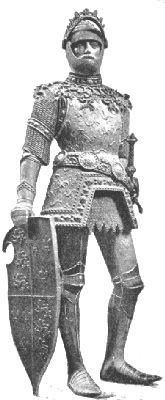I can’t even attempt to assign probabilities to some of those names, so I’ve taken the liberty of changing the rules somewhat, and also adding some names which John unaccountably overlooked.
Adam: legendary. But Science Acknowledges that one “Eve” existed Quite Some Time Ago, and she lived in Africa. As a matter of fact, science tells us that all men are women who underwent a sex change. I saw it on NOVA, so it must be true. Nyah, nyah— General Patton was a girl!
Gilgamesh: legendary, possibly inspired by historical characters.
Huang Ti: haven’t the foggiest.
Moshe: 5%. Funny thing, this “name” derives from the Egyptian “msh” (possibly pronounced in spoken Middle Egyptian something like “mosh”), which as a verb means “to be born, to be created”. The root “msh” appears in such kingly names as Rameses, Thutmose, and Ahmose.
Egyptologists agree that no one born in Egypt could possibly have actually been named “Mosh”— that doesn’t even make sense as a name, since it begs the question (answered by other Egyptian names incorporating this root): “born to WHOM? made by WHOM?” Some suggest “mosh” was a nickname, that the original name was longer. Or perhaps that’s just what the neighborhood kids called him: they say he was a foundling, so “born for (noman)” might have seemed appropriate. Kids can be so mean…
In monumental script, “mes” can be represented by several different glyphs, one of which is rather explicit: a squatting woman giving birth. By the way, I can’t believe humans are still doing that— the ones who remained women, I mean. Letting something grow inside of you, feeding off your blood— that’s disgusting! This paragraph has been brought to you on behalf of ten year olds everywhere.
The sign probably intended here is more abstract, resembling a trident but thought to represent the rafters of a “great hall”. As far as I know, only two names which are still in common use derive from ancient Egyptian roots. The other is “Susannah”.
Moroni: 0.001%. Things made up in school one day, as they say in Wikipedia. None of Joseph Smith’s tale has the least iota of plausibility, taking account of archeological and linguistic evidence.
Xenu: notation fails me.
I credit to Walt Pohl the suggestion that all religious scriptures began as a joke that took a serious turn.
Speaking of DNA evidence, the huge popularity of evening entertainment like “CSI” demonstrate that, while humans are certainly not losing their fear of death, increasingly they prefer to obliquely confront this fear through “scientific drama” rather than scriptural stories. So I figure it’s safe to slaughter some sacred cows, all in the spirit of family fun. I mean, the Church of Scientology is known for its boisterous sense of humor, right? Zowie! Jump the couch!
Zoroaster: 50% sounds about right.
Samson: legendary. All communities in all ages have traditions of strongmen.
Hercules: the same.
Theseus: legendary, but possibly based on a historical person (compare Billy the Kid). All communities in all ages have told tales of adventurers.
Odysseus: legendary; all communities in all ages have traditions of wily tricksters. In our time we tell tales of a fabulist called Nabokov. Curiously enough, Nabokov is said to have lived in Ithaca. See what I mean?
Agamemnon: composite of earlier oral traditions concerning various historical chieftans. Too bad he wound up Just Another Dead Guy on 48 Hours Mystery. Agamemnon for President! Anatolia, here we come!
Helen of Troy: all communities in all ages have traditions of great beauties. In our time we speak of Marilyn. NASA insiders insist that the first named road on the Moon will be called Mulholland Drive. The key is indigo.
Homer: composite of bards who sang and improved early versions of the “Homeric” epics.
Gautama Buddha: 100%. I know someone who met him in Crown Heights. Disappeared under mysterious circumstances on the night of July 13, 1977, hasn’t been heard from since. Reportedly sought by the FBI for questioning in the Jimmy Hoffa case.
Lao Tzu: 50% sounds about right.
Zhuangzi: not a clue.
Confucius: 80%.
Pythagoras: 50%. Possibly the fictional alter ego of a writer whose name is lost to history: Mel Brooks.
Socrates: 70%. Just because Plato told dozens of memorable stories about thim doesn’t prove he existed. I believe Chaucer existed because he was not only a prominent citizen well attested in the written record, we even have autographs. But show me the warrant for the execution of Socrates!
Plato: 90%. Show me a deed with the name of “Plato the philosopher”.
Yeshua: 40%, but if any such person ever existed (at best, there exists only brief and ambiguous historical attestations in contemporary writings), he was only a minor agitator/terrorist associate (to the Romans— that fellow Iscariot being the reputed terrorist with whom Yeshua associated) or a spiritual leader (to a handful of followers) or the kind of pamphleteer you cross the street to avoid (to modern urbanites). Scholars agree that the character of this person, if he existed at all, was completely “reinterpreted” by later writers, particularly Paul.
Mary Magdelene: legendary. All communities in all ages have had their harlots with a heart of gold.
Paul the Apostle: 95%. His letters are too obviously the work of a highly disturbed individual to be historical fictions. Actually, he creeps me out. Let’s change the subject.
Mohammed: 90% sounds about right. He fought and won battles, after all — people don’t lie about serious stuff like that, although details can be changed. C.f. the Battle of Megiddo. You can’t believe everything you read on some temple wall. What, you think Tjaneni was going to write anything suggesting that Thutmose was caught napping in his tent? That, but for the grace of the Gods, things could have taken a very nasty turn? I think not — he knew from whence he got his bread and beer.
Brynhildr: legendary, but possibly a composite of oral traditions about earlier historical figures.
King Arthur: ditto. I have read books on this tired subject and despite valiant efforts by some authors, there has never been the slightest historical evidence for such a person.
Morgaine: ditto.
Robin Hood: ditto. All communities in all ages have had their trickster legends.
Shakespeare: 80%. I’ve seen deeds and wills involving a prominent citizen in a minor town by that name. But show me the autograph manuscript of a play or a poem.
Santa Claus: legendary.
Jonathan van Post: 0%. Sure, he exists, but I happen to know he’s an advance scout for the Mucoid Invasion from Gliese 581. Keep your pod repellent handy. I have Yogi Berra on speed dial — I figure he’s the one I want negotiate with any aliens.
Chris Hillman: at the event of writing, I’ll grant the existence, but I utterly reject the “person”. But I could be wrong, so I’ll give it 3%.
James Kibo Parry: 100%. He posts, in utterly inimitable style, therefore he exists. Duh!




















Re: People Who May or May Not Actually Exist
I’ve long believed that Jim Dolan is the alter ego to whom John Baez assigns his more outrageous opinions, on e.g. capitalization.
Littlewood has a story in his Miscellany, of meeting someone who said “Oh, you really exist! I thought you were just a pseudonym that Hardy put on his weaker papers.” I give that person a 60%.